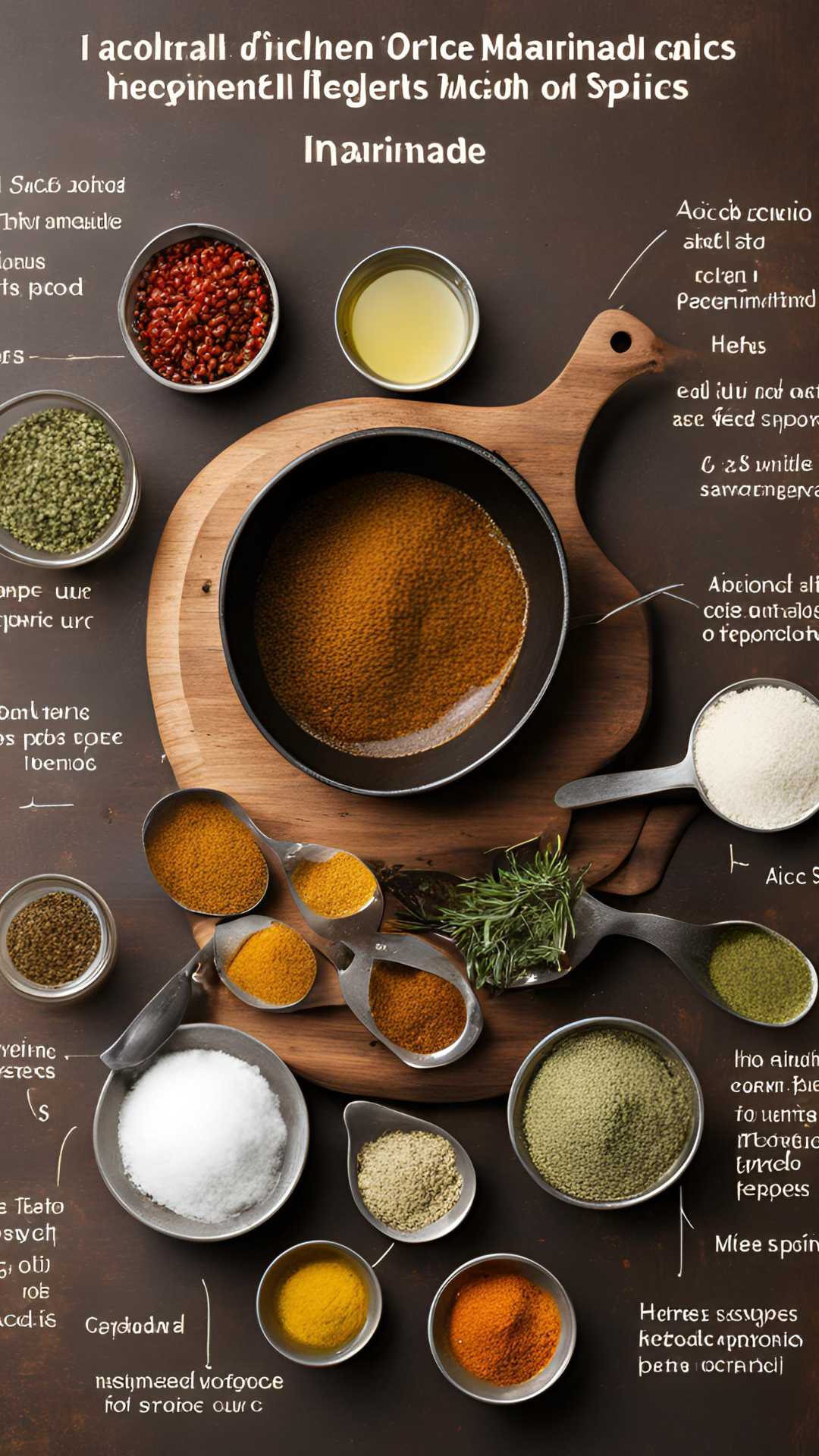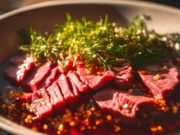- Key Takeaways:
- Understanding Marinades: What They Are and Why They Matter
- Essential Components of a Marinade
- Optimal Ratios for Mixing Marinades
- Common Mistakes to Avoid When Marinating
- How Long Should You Marinate? Timing Guidelines
- Effective Techniques for Marinating
- Foods that Benefit Most from Marinating
- Frequently Asked Questions
Unlock the secret to creating mouthwatering dishes with the perfect marinade. Whether you are grilling, roasting, or sautéing, a great marinade has the potential to elevate your food from ordinary to extraordinary.
Discover the essential ingredients that comprise a marinade, along with the optimal ratios for mixing and common pitfalls to avoid. Understand the timing of your marination and which foods benefit the most from this technique.
This guide will equip you with the knowledge needed to master the art of marinades and transform your cooking.
Engage with this information and begin to tantalize your taste buds.
Key Takeaways:
- Choose the right ingredients for your marinade – a balance of oil, acid, and seasonings is key.
- Follow the optimal ratios for mixing your marinade to ensure the perfect balance of flavor and tenderness.
- Avoid common mistakes and use effective techniques to properly marinate your food for optimal flavor and tenderness.
Understanding Marinades: What They Are and Why They Matter
Marinades are flavorful mixtures used in cooking to enhance the taste and texture of meats, fish, and vegetables. Typically, they consist of a combination of acids, oils, herbs, seasonings, and sometimes sweeteners, all working together to tenderize proteins while infusing them with moisture and flavor. This process is essential in culinary practices, as marinating can significantly elevate a dish’s overall appeal, transforming standard ingredients into exceptional meals.
The science behind marinades lies in their ability to break down proteins in the meat, allowing it to absorb the diverse range of flavors present in the mixture. Acids, such as lemon juice or vinegar, play a crucial role by denaturing proteins, which not only makes the meat more tender but also enables it to absorb the aromatic profiles offered by herbs and spices. Oils create a barrier that locks in moisture during cooking methods like grilling, roasting, or sautéing.
Various types of marinades, including dry rubs and wet mixtures, each bring a unique twist to the culinary experience, offering endless possibilities for chefs and home cooks to experiment with flavors and textures.
Essential Components of a Marinade
The essential components of a marinade consist of a base of oil, an acid for flavor enhancement, and various seasoning elements that add depth to your dish. For more information on how to create the perfect marinade, check out this article.
Oils, such as olive oil, provide moisture and help carry flavors, while acids like vinegar or citrus juices tenderize proteins and balance richness with their tanginess.
Incorporating seasonings, including herbs, garlic, salt, and sweeteners like honey or sugar, can create a complex flavor profile that complements your main ingredient, whether it be meat, fish, or vegetables.
Oil/Fat: The Base of Your Marinade
The foundation of any marinade is oil or fat, which acts as a carrier for other flavors and aids in tenderizing meats, fish, and vegetables. Common choices include olive oil, coconut milk, and buttermilk, each bringing its own unique characteristics to the marinade. The inclusion of oil helps retain moisture during the cooking process, ensuring that your final dish is juicy and flavorful, whether you are grilling, roasting, or sautéing.
For instance, olive oil enriches dishes with its robust flavor and serves as a natural emulsifier, allowing for seamless integration of vinegar and spices. Coconut milk adds a creamy sweetness that balances heat in spicy marinades, making it particularly suitable for curries and tropical-themed grilled recipes. Buttermilk, with its acidity, effectively tenderizes proteins, resulting in exceptionally succulent fried chicken or tender steak.
Employing an oil-based marinade not only enhances the taste but also optimizes texture, ensuring that grilled vegetables remain vibrantly crisp while proteins cooked in the oven maintain their juiciness. This balance of moisture and profound flavor transformation highlights the importance of selecting the right oil or fat to elevate your culinary creations.

Acid: The Flavor Enhancer
Acid serves as a crucial ingredient in marinades, functioning as both a flavor enhancer and a tenderizer for meats and vegetables. Common acidic components include vinegar, citrus juices, and dairy products like yogurt or buttermilk, each contributing a distinct taste while breaking down protein structures to increase tenderness. Achieving the right balance of acid in your marinade can brighten and elevate the overall flavor profile of your dish, making it integral to the cooking process.
For example, balsamic vinegar pairs exceptionally well with hearty cuts of beef, while lemon juice enhances the natural flavors of chicken and seafood without overpowering them. Additionally, yogurt’s lactic acid not only tenderizes meat effectively but also imparts a creamy tang, making it an excellent choice for marinating lamb or chicken in Mediterranean dishes.
Using pineapple juice as a marinade introduces a subtle sweetness to pork chops, balancing the richness of the fat and adding a tropical flair. By carefully selecting and combining acidic ingredients, cooks can create marinades that improve texture while crafting a delightful and complex flavor profile, ultimately enhancing the overall dining experience.
Seasonings: Adding Depth and Complexity
Seasonings are essential to any marinade, providing the depth and complexity that can transform ordinary ingredients into extraordinary dishes. Incorporating fresh herbs, garlic, and spices like chili powder can infuse the marinade with vibrant flavors, while salt and sugar enhance the overall taste and balance the other components.
The careful selection of seasonings is crucial for achieving a well-rounded flavor profile in your marinated meats, fish, or vegetables.
These seasonings work together to create an interplay of tastes, elevating simple recipes into gourmet meals. For instance, aromatic herbs such as rosemary or thyme introduce earthy notes, while a dash of acidity from citrus or vinegar adds brightness, effectively cutting through richness.
It is important to experiment with different combinations, ensuring that stronger spices do not overpower subtler flavors.
Achieving this equilibrium is key to developing a marinade that enhances the natural attributes of the main ingredient, whether it is grilled, roasted, or baked. This approach paves the way for culinary exploration and delightful dining experiences.
Optimal Ratios for Mixing Marinades
Understanding the optimal ratios for mixing marinades is crucial for achieving the best results in flavor and texture. A well-balanced marinade typically adheres to the guideline of three parts oil to one part acid, with additional seasoning ingredients adjusted according to your taste preferences. This ratio ensures that the marinade adheres effectively to the meat or vegetables while allowing the flavors to penetrate deeply, enhancing the overall taste of your dish.
For instance, when utilizing citrus juices such as lime or lemon as the acid component, the brightness they provide can elevate the dish’s flavors, creating a balance against the richness of the oil. Conversely, if you aim for a more intense flavor profile, you might consider a 2:1 oil to acid ratio when using stronger acids like balsamic vinegar or soy sauce, which can dominate if not balanced properly.
Incorporating herbs and spices allows you to add another layer of complexity, enabling you to personalize your marinades further. The science behind marination reveals that these ratios influence not only taste but also texture, allowing proteins to become tender while absorbing unique flavor notes, especially when marinated for the appropriate amount of time before cooking.
Common Mistakes to Avoid When Marinating
When marinating, it is crucial to avoid common mistakes to unlock the full potential of your ingredients and achieve maximum flavor. One frequent error is over-marinating, which can lead to a mushy texture in proteins or overly intense flavors. Additionally, failing to properly balance the components of the marinade can result in a lack of harmony, undermining the dish’s overall taste.
To truly elevate your dish, it is essential to understand the appropriate marinating times for various proteins; for example, poultry typically requires less time than beef. Using too much acid, such as vinegar or citrus juice, can also adversely affect the texture, so adhering to the recommended ratios is vital.
To avoid these pitfalls, consider setting a timer and taste-testing during the marination process, allowing for necessary adjustments. Remember, achieving the perfect blend of spices, oils, and acids not only enhances the flavor but also preserves the desirable texture of your ingredients.
How Long Should You Marinate? Timing Guidelines
The appropriate marinating time can vary significantly based on the type of protein or vegetable being used, making timing guidelines essential for achieving optimal results. Delicate proteins like fish may only require 15 to 30 minutes, while tougher cuts of meat, such as skirt steak, might benefit from several hours or even overnight marination. Understanding the ideal marinating time for each ingredient ensures that flavors are absorbed effectively without compromising texture.
For instance, chicken breasts typically yield the best flavor when marinated for at least 1 to 2 hours, allowing the marinade to penetrate the meat and enhance its juiciness. In contrast, root vegetables may only require a shorter marinating period of 30 minutes to an hour, as longer soaking can result in overly mushy textures.
When preparing grilled dishes or stir-fried meals, it is essential to monitor the marination process—watching for changes in color and aroma can indicate that the ingredients are adequately infused. Additionally, it is helpful to consider how different cooking methods, such as grilling, roasting, or sautéing, can influence the length of time needed for effective marination.
Effective Techniques for Marinating
Effective marinating techniques can significantly enhance the infusion of flavors into your meats, fish, and vegetables, ensuring a delicious final outcome. Utilizing a zip-top bag or a well-sealed marinating vessel allows for uniform coating and maximizes contact between the marinade and the food, promoting optimal flavor absorption. Additionally, employing techniques such as massaging the marinade into the proteins can further enhance the marinating process.
This method proves highly effective, as the physical action helps to break down the protein fibers, allowing the marinade to penetrate deeper and enrich the meat’s texture and taste. For the best results, you should vary the marinating time depending on the type of food—fish typically requires less time compared to tougher meats, which benefit from extended marinating periods.
Experimenting with different acidic components, such as citrus juices or vinegar, can also transform the interplay of flavors, making each dish unique and memorable while elevating the dining experience.
Foods that Benefit Most from Marinating
Certain foods greatly benefit from marinating, as this process enhances their flavor and tenderness, transforming them into culinary delights. Proteins such as chicken, fish, and beef respond particularly well to marinades, deeply absorbing flavors and improving texture. Additionally, vegetables like zucchini, bell peppers, and tomatoes, along with plant-based options such as tofu and shrimp, can be elevated through marinating.
For instance, marinating chicken in a mixture of yogurt and spices not only tenderizes the meat but also infuses it with a rich, tangy flavor, making it perfect for grilling or roasting. Fish benefits significantly from a citrus-based marinade, which brightens its natural taste and is ideal for pan-searing or baking. Vegetables like mushrooms are enhanced by a soy sauce and garlic marinade, amplifying their umami qualities before sautéing or roasting. Similarly, marinated shrimp is excellent when skewered, offering a perfectly balanced flavor that shines when grilled.
These examples illustrate that the art of marinating can truly transform simple ingredients into standout dishes, enhancing not only flavors but also the overall dining experience.
Frequently Asked Questions
What are the essential ingredients for creating the perfect marinade?
The essential ingredients for creating the perfect marinade are oil, acid, salt, sweetener, and flavorings. These ingredients work together to tenderize and flavor the meat.
What are the ideal ratios for the essential ingredients in a marinade?
The ideal ratio for oil to acid is 3:1, meaning 3 parts oil to 1 part acid. The ratio for salt to sweetener is 1:1, and the amount of flavorings can vary depending on personal preference.
Can I use any type of oil in my marinade?
You can use any oil that has a high smoke point, such as vegetable oil, canola oil, or grapeseed oil. Avoid using oils with a low smoke point, like olive oil, as they can burn and create a bitter taste.
What is the best type of acid to use in a marinade?
The best types of acids to use in a marinade are citrus juices (such as lemon, lime, or orange), vinegar (such as apple cider or balsamic), or yogurt. These acids help to tenderize the meat and add flavor.
How long should I marinate my meat for?
The length of time for marinating depends on the type and cut of meat. Generally, tougher cuts of meat can benefit from longer marinating times, ranging from 2 hours to overnight, while more delicate cuts may only need 30 minutes to an hour.
Are there any additional tips for creating the perfect marinade?
Yes, make sure to use fresh herbs and spices for maximum flavor. Also, reserve some of the marinade before adding the meat to use as a basting sauce while grilling. Finally, make sure to marinate in a non-reactive container, such as glass or plastic, to avoid any unwanted flavors from metal containers.



















































